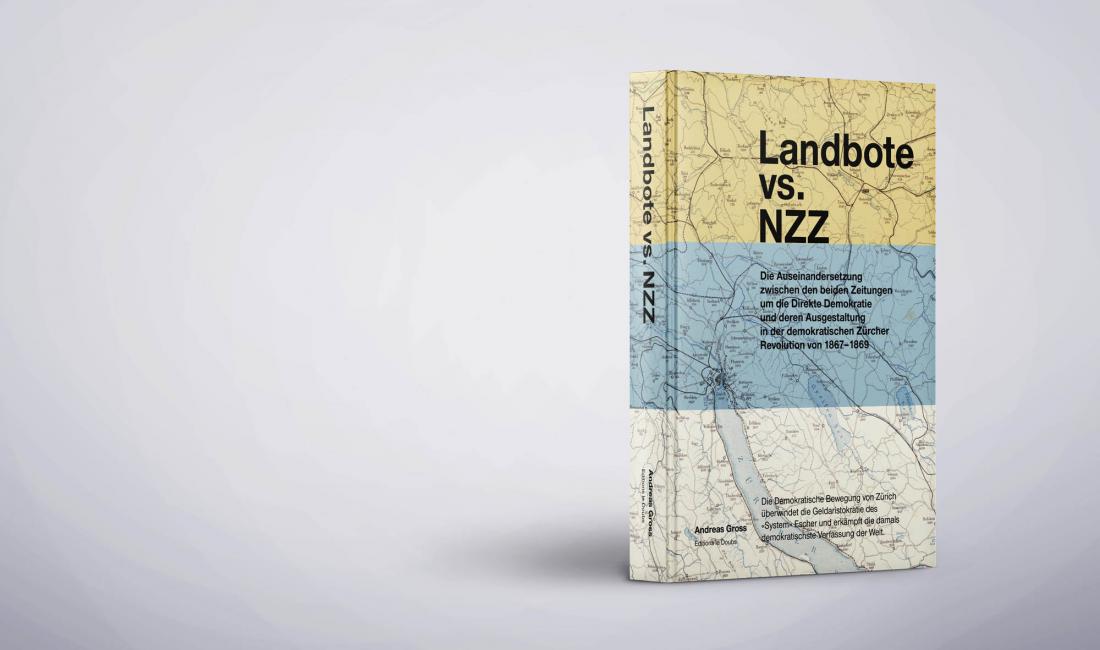Former Swiss Politician Andreas Gross’ Book about Swiss Democracy's Origins Holds Global & Local Lessons
A NEW BOOK: Andreas Gross, Landbote vs. Nzz. St Usanne: Edition le Doubs, 2024. Book cover courtesy of the publisher.
The title of the book sounds rather like a court case: Landbote vs. NZZ. But under that title lies a tale of the pitched battle to introduce direct democracy into Switzerland. The title actually refers to two local newspapers who took opposing stands in that constitutional showdown.
As a matter of plot, this book describes how an unaccountable, wealthy elite, messed up a health pandemic—and suffered the consequences.
In 1848, when the new constitution for Switzerland was introduced, the Liberal Party of Switzerland—which combined muscular free-market economics with muscular secularism—reigned supreme in the Canton of Zürich. The political system was organised such that the Liberal Party would always have a majority of the seats – but not win a majority of the votes. This was especially so in the highly industrialised Zurich Canton. (A Canton, by the way, is the Swiss word for a state).
Zurich was ruled by iron fist by Alfred Escher, a wealthy businessman who had been a political science professor. He was also one of the railway pioneers, and the railways were monopolies that used their undue influence to enrich themselves.
But even the rich and powerful make mistakes. In 1867 a cholera epidemic broke out. In a precursor of the Covid-19 response some 150 years later, the authorities ordered a lockdown. But not all were treated equally. While working classes stayed in their city houses, the wealthy retreated to their estates in the surrounding mountains. Many of the former died.
That reality changed Zurich. While Alfred Escher remained in power, he had to assent to a new constitution that “sovereignty resides in the people as a whole.” This aim was backed up by allowing the citizens to challenge legislation through ballot propositions.
It has been said that journalism is the first draft of history. Andreas Gross, himself a former journalist, makes a virtue of this dictum by telling the story of the epidemic and the subsequent democratic revolution through selected articles by the two leading newspapers.
In doing so we get a ringside account to the bout, which is fresh and informative, especially as it is interspersed with pen portraits of the dramatis personae. In addition to Escher we encounter Karl Bürkli, a utopian socialist, who had set up a commune in Texas before returning to his native Switzerland to spearhead the movement for more direct democracy.
Political scientists talk about critical junctures in history— turning points during which history takes a new direction due to contingent factors. The epidemic and the elite’s mishandling of it was a quintessential example of this.
That this story turned out to be a defining moment was above all because Bürkli had a vision, and a plan for direct democracy, and that the momentarily weakened elite was forced to accept the introduction of direct democracy. Following on from this, mechanisms of direct democracy—of the initiative and referendum that people all over the world now know and use, mostly at the local and sub-national levels—was introduced into the Swiss federal constitution.
This was a miscalculation on the part of the elite. Zurich rulers clearly did not anticipate the consequences of their concession. But that only makes the story more pertinent.
That Gross was also a long-serving member of the Swiss parliament—and a champion of some of the most momentous referendums in his country—only makes this book more relevant and useful. As a politician, Mr Gross spearheaded a constitutional initiative to abolish the Swiss army. The proposal failed, but it forced the government to make fundamental changes to the conscription law that mandated that all male Swiss serve in the military. But that is another story, though one it is useful to keep in mind when reading this inspirational and highly original account of a development in a small part of a small nation.
In this day and age, resentment with the elites seem to result in unconstructive anger, with no overall vision for the future apart from a defuse longing for a non-existent pastoral past. In the early 20th century, reformers in California and other U.S. western states used the example of Switzerland as their guiding light. The so-called Americans populists and progressives who installed direct democracy were directly inspired by Bürkli and his comrades in Zürich.
One can only hope that this book gets translated into English, and that the people lamenting the power of their own unresponsive elites learn the lessons of the idealistic folk of Zurich. History is not destined to repeat itself, but it is worth being inspired by glorious deeds of the past.




